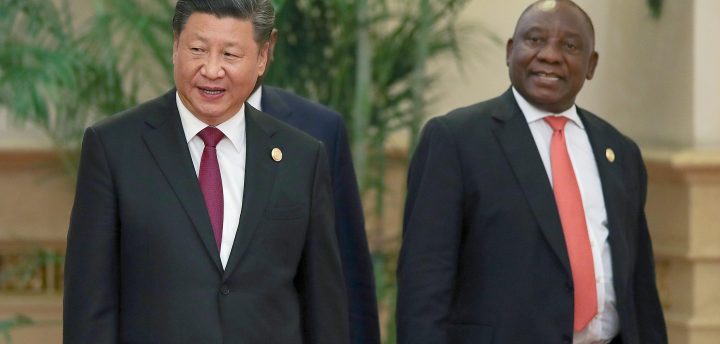OP-ED
Policy lessons from post-1978 China

As South Africa rededicates itself to finally executing the National Development Plan after the lost decade, post-1978 China offers lessons in terms of policy. These lessons are distilled as policy pragmatism, policy discipline and policy sovereignty.
When Deng Xiaoping announced the reform and opening up policy (Gaige Kaifeng), it signalled the wholesale transformation of China from a third world to a leading economy in 2019. His policy prescriptions emphasised less, ideological dogma, and highlighted more pragmatic applicability. Practically it meant merging what worked elsewhere with useful local models to produce a “socialist market economy”.
When he talked of opening up the economy, Deng meant synthesising the western market economy with state planning staffed by efficient, capable and selfless civil servants. It helped that China already had a 2000-year long tradition of regularised civil servant examinations and retraining, namely its meritocracy system. Chinese pragmatic policy, merging the west and east, amounts to reliance on common sense than over-reliance on ossified policies.
The aggregate results of such pragmatism are that the peasantry gained economic independence and workers benefited from unprecedented investments by western multinational companies. To Deng, pragmatism is disinterested in dogma, because, as he famously said: “It does not matter whether a cat is black or white, if it catches mice it is a good cat.”
Therefore, the NDP demands immediate implementation to test whether it is effective or not. The constant arguments about its merits or demerits, even before actual implementation, is a Sisyphean task that does not deliver any practical public goods for a country battling with epidemic-levels poverty, inequality and unemployment. As the ANC policy czar is fond of saying, we should prioritise implementation even as we tinker with sections we are displeased with in the NDP. After all, the NDP Vision 2030 is only a guide and not a fixed biblical blueprint.
With pragmatism comes policy discipline. South Africa is notorious for conceptualising policies and not make follow through continuously. This is a consequence of the sins of incumbency. Every national leader and top bureaucrat wish to implant their stamp into the policy sphere with the hope of securing their own legacy and not necessarily that of the party in government.
Policy schizophrenia means that, since 1994, instead of implementing to fruition or not, the RDP, this was soon replaced with GEAR, and before long, GEAR was substituted for AsgiSA and JIPSA. One would think that these mega-policy prescriptions are products of different governing parties, whereas, we have had one governing party since the 1994 democratic dispensation.
As Deng proclaimed when revealing the opening-up period, “only if we emancipate our minds, seek truth from facts, proceed from reality and integrate theory and practice” can leaders and their parties deliver common goods. The delivery of common goods, using pragmatic policies and policy discipline, have remained relatively steady in China during the eras of Deng, Jiang Zemin, Hu Jintao and the current president, Xi Jinping.
Hence China has done what no country in the entire human history has achieved, namely, uplift 700-million poor people to a middle-class lifestyle, all in the space of 30 years. Admittedly, such record level economic growth, infrastructure development and social mobility have produced unintentional costs of untold environmental damage, corruption and wealth inequality.
This explains why Xi has promulgated several legislations to reverse pollution of the skies and waterways so that China can meet its SDG 2030 targets, unlike the present White House incumbent who unilaterally pulled the US out of the Paris Climate Change Agreement, as he did, the Iran nuclear deal, the INF treaty with Russia and other international commitments while threatening regime change in Venezuela. The net effect is that now China is touted as the best and trusted guarantor of international agreements and the globalisation framework.
The third lesson from China is around policy sovereignty. The main reason China, Russia and South Africa are against the imposition of a coup in Venezuela, led by the US and European Union (EU), is because of what eventually happened in Afghanistan 2001, Iraq 2003, Libya in 2011 after democracy was imposed through military interventions instead of democratic dialogue.
As the commentator from The Guardian, Simon Jenkins, said recently, such a coup collapses the authority of the United Nations (UN), and most importantly, “even states in political distress are sovereign. They must make and correct their own mistakes”. Furthermore, according to Jenkins, “how would we react if Maduro told us how to handle our Brexit mess?” Or is this an example of brazen Eurocentrism?
Policy sovereignty also implies the protection in law, of policies agreed to by the government in power. It means the judiciary and parliament act as overseers of legislated policies irrespective of which leaders or political party is power. Hence China and Russia, among other external investors, are anxious about the events in Venezuela. After all, local and international investors are first to complain that without legislative, executive and parliamentary guarantees protection, this does not augur well for inviting investor confidence. DM
Paul Zilungisele Tembe is a Fellow at TMALI and Associate Professor of Zhejiang Normal University and Jeffrey Sehume is a contracted public servant.


















 Become an Insider
Become an Insider